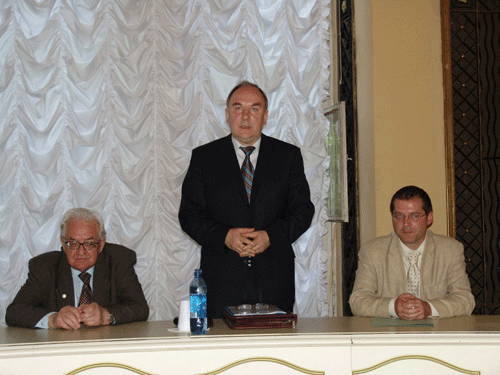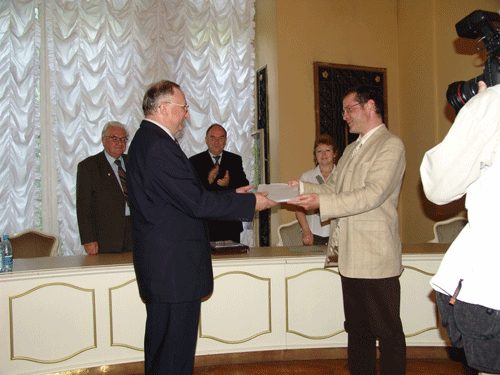About Program |
РУССКИЙ ENGLISH |
The epidemiological situation with the HIV-infection in the Russian Federation has been steadily deteriorating and posing a real threat to the country as a whole and to each region. Currently, over 313 thousands of HIV-infection cases have been reported, and 80% of them fall on the age group from 15 to 30 years of age. The HIV-infection prevalence increased from 121 per 100,000 population in 2001 to 218.3 per 100,000 population in 2004, and in the group from 15 to 49 years of age it has already reached 327.7 per 100,000 population.
In the last several years, it has become more challenging to provide treatment to people living with HIV/AIDS and to ensure social and palliative support for them. There is a real need to improve the system of providing specialized medical care to people living with HIV/AIDS, training of medical professionals and psychologists in new methods of treatment, care, and support for people living with HIV/AIDS.
A Country Coordinating Mechanism has been established in the Russian Federation. Its membership includes senior executive officers of the Ministry of Health and Social Development and the Ministry of Justice of the Russian Federation, the Russian Academy of Medical Sciences and other agencies, representatives of international organizations and civil society.
The Country Coordinating Mechanism developed and submitted a proposal for implementing the Program of "Promoting a Strategic Response to HIV/AIDS Treatment and Care for Vulnerable Populations in the Russian Federation". The proposal for a five-year program of US$120.5M worth was approved by the Global Fund to Fight AIDS, Tuberculosis and Malaria.
The Country Coordinating Mechanism approved the Russian Health Care Foundation as a principal recipient of the grant and an executive agency for the Program implementation accordingly.
The Program's goal is to reduce the HIV-related morbidity and mortality by expanding the access to HIV prevention, treatment, care and support for people living with HIV/AIDS, with a particular focus on poor and marginalized populations.
The Program is based on a comprehensive evidence-based approach and aimed at fulfilling the following six key tasks:
 Increase the identification and referral of people living with HIV/AIDS who require treatment and care, with a special focus on vulnerable populations.
Increase the identification and referral of people living with HIV/AIDS who require treatment and care, with a special focus on vulnerable populations.
 Expand access to quality HIV-related treatment for people with advanced HIV/AIDS and/or those exposed to HIV, with a special focus on vulnerable populations.
Expand access to quality HIV-related treatment for people with advanced HIV/AIDS and/or those exposed to HIV, with a special focus on vulnerable populations.
 Strengthen palliative care and psychological and social support for people living with HIV/AIDS and support to those affected by HIV/AIDS, with a special focus on vulnerable populations, including orphans.
Strengthen palliative care and psychological and social support for people living with HIV/AIDS and support to those affected by HIV/AIDS, with a special focus on vulnerable populations, including orphans.
 Strengthen the capacity of the Russian health system at the federal and regional levels to provide effective HIV/AIDS treatment, care and support to people living with HIV/AIDS.
Strengthen the capacity of the Russian health system at the federal and regional levels to provide effective HIV/AIDS treatment, care and support to people living with HIV/AIDS.
 Promote a supportive environment for the delivery of programs and services related to HIV treatment and care, particularly for marginalized and vulnerable populations.
Promote a supportive environment for the delivery of programs and services related to HIV treatment and care, particularly for marginalized and vulnerable populations.
 Strengthen national and regional capacity to conduct monitoring and surveillance of treatment and care of people living with HIV/AIDS and conduct operational research regarding key aspects of treatment, care and support.
Strengthen national and regional capacity to conduct monitoring and surveillance of treatment and care of people living with HIV/AIDS and conduct operational research regarding key aspects of treatment, care and support.
The Program activities will be carried out both at the federal and regional levels in close cooperation with the Ministry of Health and Social Development of the Russian Federation, the Federal Scientific and Methods Center for AIDS Control, Rospotrebnadzor, and the Federal Penitentiary Service, as well as international organizations and other federal and regional government and non-government organizations working in this area. In general, the Program will cover 59 regions. The first two-year period of the Program will start in September 2005 and is supposed to involve 14 regions of the Russian Federation.
The activities planned under the Program include the following:
To provide anti-retroviral drugs for patients with HIV/AIDS and, accordingly, to significantly expand the coverage of HIV-infected people with treatment;
To update or develop national policies, regulations, guidelines and clinical protocols relating to HIV/AIDS treatment, care and support;
To establish a nation-wide training system for HIV/AIDS treatment, care and support, including training of trainers and specialists in HIV voluntary testing and counseling; anti-retroviral therapy; prevention of mother-to-child transmission; post-exposure prophylaxis; palliative care and psychosocial support; management of vulnerable populations, procurement and distribution of anti-retroviral drugs, etc.;
To supply laboratory equipment to strengthen regional laboratories for therapeutic monitoring and introduce information system for monitoring patients under care and pre-care at the regional and federal levels;
To develop and disseminate materials on treatment, prevention, care, and support for healthcare providers and NGOs;
To strengthen HIV prevention among vulnerable groups, strengthen or expand comprehensive HIV/AIDS outreach services to intravenous drug users, commercial sex workers, and men who have sex with man;
To strengthen palliative care and psychological support to people living with HIV/AIDS;
To disseminate information for patients on voluntary HIV-testing and consulting, referrals to treatment, anti-retroviral therapy, treatment adherence, psychological and social support;
To support institutions, providing psychological and social care to children orphaned or made vulnerable by AIDS;
To improve the quality of HIV testing and counseling and HIV/AIDS treatment and care within the prison system;
To support civil society efforts (NGOs, CBOs, PLWHA) to reduce stigma and discrimination;
To support a program of operational research regarding key aspects of treatment, care and support.
As a result of implementation of the five-year Program, over 7000 health care providers will improve skills in the management of HIV/AIDS, 74,000 people living with HIV/AIDS will receive combined anti-retroviral therapy and psychological support, including adherence counseling. 20 prisons will be equipped to provide comprehensive HIV/AIDS treatment and care services. About 100,000 individuals among vulnerable populations will receive services through prevention programs in 59 regions of the Russian Federation.
Opening of Country Coordinating Commitee Meeting

Handing Over Grant Agreement



